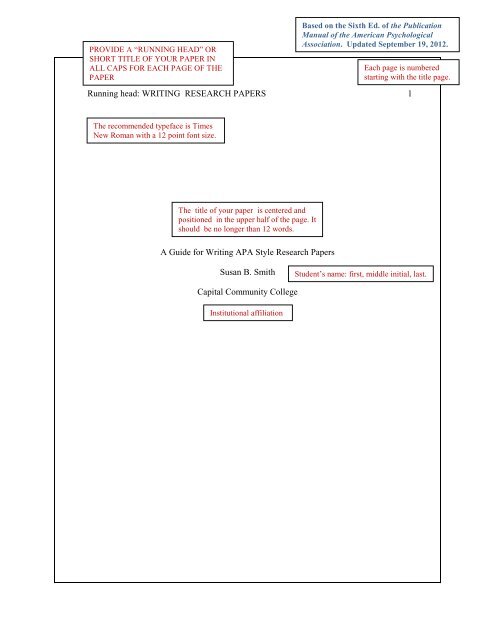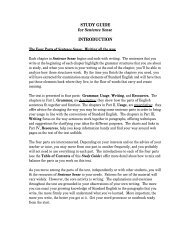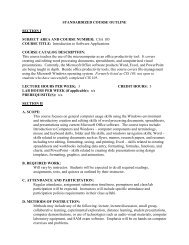Running head: WRITING RESEARCH PAPERS 1 A Guide for ...
Running head: WRITING RESEARCH PAPERS 1 A Guide for ...
Running head: WRITING RESEARCH PAPERS 1 A Guide for ...
You also want an ePaper? Increase the reach of your titles
YUMPU automatically turns print PDFs into web optimized ePapers that Google loves.
PROVIDE A “RUNNING HEAD” OR<br />
SHORT TITLE OF YOUR PAPER IN<br />
ALL CAPS FOR EACH PAGE OF THE<br />
PAPER<br />
<strong>Running</strong> <strong>head</strong>: <strong>WRITING</strong> <strong>RESEARCH</strong> <strong>PAPERS</strong> 1<br />
The recommended typeface is Times<br />
New Roman with a 12 point font size.<br />
The title of your paper is centered and<br />
positioned in the upper half of the page. It<br />
should be no longer than 12 words.<br />
A <strong>Guide</strong> <strong>for</strong> Writing APA Style Research Papers<br />
Susan B. Smith<br />
Capital Community College<br />
Institutional affiliation<br />
Based on the Sixth Ed. of the Publication<br />
Manual of the American Psychological<br />
Association. Updated September 19, 2012.<br />
Each page is numbered<br />
starting with the title page.<br />
Student’s name: first, middle initial, last.
Type the<br />
abstract in<br />
block <strong>for</strong>mat,<br />
one paragraph,<br />
no indentations<br />
and double<br />
spaced.<br />
The running <strong>head</strong> or short title<br />
An abstract is a brief comprehensive<br />
summary of the paper between 150 and<br />
250 words. Do not add to or comment on<br />
the body of the work here. It provides the<br />
Page number<br />
<strong>WRITING</strong> <strong>RESEARCH</strong> <strong>PAPERS</strong><br />
reader with a brief overview of the article.<br />
2<br />
Abstract<br />
This paper is a guide to writing a general paper in according to the Publication Manual<br />
of the American Psychological Association. The guide instructs a user on how to <strong>for</strong>mat<br />
a paper in APA style, illustrating structure, style and content, as well as presenting detailed<br />
examples of references cited, including print examples of books, magazine articles and<br />
reference works. Additional examples are provided <strong>for</strong> electronic versions of the above.<br />
Keywords: APA, research papers, <strong>for</strong>mat, style guide<br />
Check with your instructor to<br />
see if an abstract and/or<br />
keywords are required elements<br />
of your paper.
<strong>WRITING</strong> <strong>RESEARCH</strong> <strong>PAPERS</strong> 3<br />
A <strong>Guide</strong> <strong>for</strong> Writing APA Style Research Papers<br />
Type and center the title<br />
of the paper on this page.<br />
Do not bold or underline.<br />
There are several different types of articles appropriate <strong>for</strong> publication in the<br />
APA or American Psychological Association style. These include reports of empirical<br />
studies, literature reviews, theoretical articles, methodological articles, and case studies.<br />
Each of these types of articles follows a proscribed <strong>for</strong>mat. Refer to the Publication<br />
Manual of the American Psychological Association, 6 th 1 inch margins<br />
on all sides 1 inch margins<br />
on all sides.<br />
Leave right side<br />
ragged and do<br />
edition <strong>for</strong> the most up to date<br />
not hyphenate<br />
words.<br />
The <strong>head</strong>ing<br />
style<br />
recommended by<br />
APA consists of<br />
5 possible<br />
<strong>for</strong>matting<br />
arrangements.<br />
Check with your<br />
instructor and/or<br />
the APA Manual<br />
section 3.02 <strong>for</strong><br />
further guidance<br />
regarding<br />
<strong>head</strong>ings.<br />
<strong>Running</strong> <strong>head</strong> on every page<br />
and comprehensive details of setting up your manuscript. This paper will serve as a<br />
general guide only, and as always, your instructor has the final word on the <strong>for</strong>mat and<br />
style required <strong>for</strong> the assigned paper.<br />
Level 1 Heading<br />
Page 3 begins the body of the paper.<br />
1 inch<br />
margin<br />
Method<br />
A research paper presents the results of your investigations on a selected topic.<br />
Based on your own thoughts and the facts and ideas you have gathered from a variety of<br />
sources, a research paper is a creation that is uniquely yours. The experience of<br />
gathering, interpreting, and documenting in<strong>for</strong>mation, developing and organizing ideas<br />
and conclusions, and communicating them clearly will prove to be an important and<br />
satisfying part of your education. Generally, the <strong>for</strong>matting of citations recommended<br />
below is based on the American Psychological Association guidelines. Your instructor<br />
may require another <strong>for</strong>mat. It is important to follow consistently and accurately a<br />
recommended <strong>for</strong>mat that is clear and concise and that has been approved by your<br />
teacher. This guide may suffice <strong>for</strong> most students' needs <strong>for</strong> most academic purposes, but<br />
<strong>for</strong> advanced research projects it is by no means a substitute <strong>for</strong> the Publication Manual<br />
1 inch<br />
margin<br />
2 spaces after a<br />
punctuation mark<br />
helps the reader.
If a quotation is<br />
40 or more<br />
words, start a<br />
new line, using<br />
a block<br />
quotation;<br />
indent as if a<br />
new paragraph,<br />
double space,<br />
and do not use<br />
quotation<br />
marks.<br />
Quotations<br />
<strong>WRITING</strong> <strong>RESEARCH</strong> <strong>PAPERS</strong> 4<br />
of the American Psychological Association Sixth Edition (2010). That handbook can be<br />
purchased in most bookstores and copies should be available in every college and<br />
municipal library. This guide and a guide similar to this one, but based on the MLA<br />
style, are available online. “Your best source of advice on all these matters is, of course,<br />
your instructor and your library professionals” (Darling, 2008, p. 98).<br />
Once your topic has been approved, gather in<strong>for</strong>mation from authoritative sources:<br />
pertinent books, encyclopedias, and articles in magazines, journals, and newspapers.<br />
Librarians will be happy to show you how to use the various research tools<br />
within the library and may suggest other sources of in<strong>for</strong>mation. Important new resources<br />
are now available to you through electronic services which provide many learning and<br />
reference tools as well as access to the Internet, where you can often discover an<br />
abundance of in<strong>for</strong>mation. Depending on the resources available and the length<br />
of your assignment, you may find it necessary to widen or restrict the scope of your<br />
topic (Darling, 2008, pp. 96-97).<br />
Level 1 Heading<br />
Discussion<br />
Using someone else's ideas or phrasing and representing those ideas as your own,<br />
either on purpose or through carelessness, is a serious offense known as plagiarism.<br />
Ideas or phrasing includes written or spoken material, from whole papers<br />
If you are instructed by your professor<br />
to use <strong>head</strong>ings, refer to section 3.02 of<br />
the Publication Manual of the APA.<br />
and paragraphs to sentences, and, indeed, phrases but it also includes statistics, lab<br />
results, art work, etc. Someone else can mean a professional source, such as a published<br />
Quotations<br />
fewer than<br />
40 words are<br />
incorporated<br />
into the text<br />
using quote<br />
marks. Cite<br />
the specific<br />
page of the<br />
quote.
Options 1, 2, and 3 are all acceptable<br />
<strong>for</strong>mats <strong>for</strong> pointing to the source listed<br />
on the reference page.<br />
Option #1<br />
Personal<br />
communication,<br />
option #1<br />
<strong>WRITING</strong> <strong>RESEARCH</strong> <strong>PAPERS</strong> 5<br />
writer or critic in a book, magazine, encyclopedia, journal or in an electronic resource<br />
such as material you discover on the Internet; another student at your school or<br />
anywhere else; or a paper-writing service which offers to sell written papers <strong>for</strong> a fee.<br />
Newton (2011) found that he penalty <strong>for</strong> plagiarism is usually determined by the instructor<br />
teaching the course; in many schools and colleges, it could involve failure <strong>for</strong> the paper and<br />
it could mean failure <strong>for</strong> the entire course and even expulsion from school. At the very least,<br />
however, students who plagiarize have cheated themselves out of the experience of being<br />
responsible members of the academic community and have cheated their classmates by<br />
pretending to contribute something original which is, in fact, a cheap copy (Newton, 2011).<br />
Summary and Concluding Discussion<br />
(Newton, 2011, p. 11)<br />
One-inch margins at the top, bottom, right and left sides are now required by APA.<br />
Double spacing is required throughout the paper. In 2011 Newton stated that if you wish to<br />
Option #3<br />
use single spacing <strong>for</strong> quotations of verse and drama because it more nearly approximates<br />
what the poet would want, you must consult with your instructor be<strong>for</strong>e doing so.<br />
Each page is numbered consecutively including title page and reference page. Type the<br />
numbers in the upper right-hand corner using Arabic numerals. Arrange the manuscript as<br />
follows: title page, abstract, body of the paper, and reference page. A short title is used<br />
throughout the paper. R. Newton (personal communication, July 20, 2012) states that the<br />
short title is a two or three word derivation of the title of the paper. If the title of your paper<br />
were Understanding Patterns of Byzantine Intrigue, the short title could be Byzantine Intrigue<br />
(R. Newton, personal communication, July 20, 2012).<br />
Citing references in text<br />
Personal communication, option #2<br />
Option #2<br />
or<br />
(Newton, 2011, Chapter 3)<br />
or<br />
Do not include references to personal<br />
communications, such as letters, emails,<br />
interviews, telephone conversations on the<br />
reference page as they are not recoverable.<br />
You may however cite them in-text. What you<br />
cite should have scholarly relevance.
<strong>WRITING</strong> A <strong>RESEARCH</strong> PAPER 6<br />
Use Times New Roman 12 point font.<br />
Include the DOI<br />
(digital object<br />
identifier) in<br />
your citation<br />
whenever it is<br />
provided.<br />
Capitalize only<br />
the first word of<br />
a journal article<br />
title and subtitle.<br />
Do not italicize.<br />
References<br />
Darling, C. (2008). Saints of diminished capacity. New York: Random House.<br />
Language (2009). In Columbia electronic encyclopedia. Retrieved September 18,<br />
2012, from http://www.in<strong>for</strong>mationplease.com<br />
Harkavy, W. (2010, November 3). Educational writings. Village Voice.<br />
Retrieved September 8, 2012 from http://villagevoice.com<br />
Newton, R. (2011). A reference guide to learning about research. Hart<strong>for</strong>d,<br />
CT: Merganser University Press.<br />
South, S., Oltmanns, T., & Turkheimer, E. (2009). Interpersonal communication<br />
across peer groups. Journal of Communication, 73, (2) 675-692.<br />
doi: 10.1111/j.1467-6494.2005.00325<br />
South, S.,Oltmanns, T., & Turkheimer, E. (2009). Interpersonal communication<br />
across peer groups. Journal of Communication, 73, (2) 675-692. Retrieved<br />
from http://search.ebscohost.com<br />
APA Style<br />
Arrange entries in alphabetical order by the<br />
author’s last name, or if no author, by the 1 st<br />
word in the citation.<br />
Include page number in upper right corner<br />
Wheatcroft, G. (2008, June). The challenge of education. The Atlantic, 293(3), 56–72.<br />
The reference page provides the<br />
in<strong>for</strong>mation necessary <strong>for</strong> a reader to locate<br />
and retrieve any source you cite. Each<br />
source you cite in the paper must appear in<br />
your reference list.<br />
Book with 1 author<br />
Article retrieved from an<br />
online reference work with no<br />
author<br />
Web site<br />
Book 1 author<br />
Online journal<br />
article with DOI.<br />
Online journal<br />
article from a<br />
database with<br />
no DOI. (Same<br />
article as above<br />
when no DOI<br />
is provided).<br />
Print journal article. Full title<br />
italicized in upper and lowercase<br />
letters. Italicize the volume<br />
number but not the issue and<br />
page numbers.







